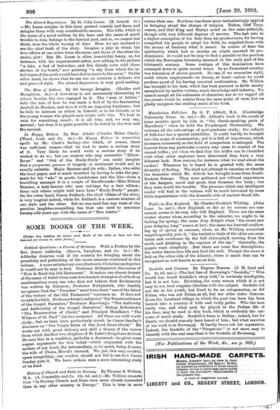History of Church and State in Norway. By Thomas B.
Wilson, MA. (A. Constable and Co. 12s. 6d. net.)—Mr. Willson remarks that "in Norway Church and State were more closely connected than in any other country in Europe." This is true in more senses than one. Nowhere was force more unhesitatingly applied in bringing about the change of religion. Hakon, Olaf Tryg- vesson, and Olaf King and Martyr acted on the same principle, though with very different degrees of success. The last rose to a higher conception of his duty than his predecessors, for having compelled his people to adopt his faith, he supplied them with the means of learning what it meant. In course of time the spirituality which had so secular an origin asserted its pre- dominance. It would not be easy to find a parallel to the position which the Norwegian hierarchy assumed in the early part of the thirteenth century. Some vestiges of this domination have remained down to quite recent times. In no Protestant country was toleration of slower growth. No one, if we remember right, could obtain employment—in theory, at least—unless he could produce proof of his having received confirmation. Mr. Willson has brought to his task, which has been pursued in fields mostly unexplored by earlier writers, much knowledge and industry. We cannot accept all his estimates of character, nor do we regard all the events which he relates from the same point of view, but we gladly recognise the sterling merit of his book.










































 Previous page
Previous page